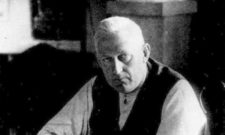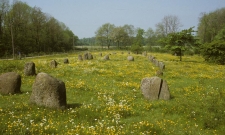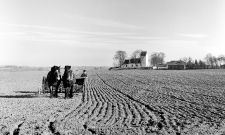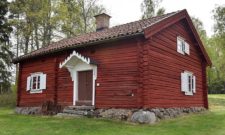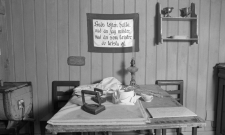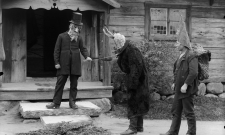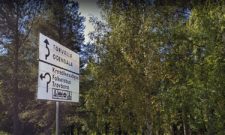Shop our historical maps

Apr
"All that is based on the denial of one's own becomes powerless and certain. Powerless and withered is the art of the state which denies its own." - Torgny Segerstedt, 18 September 1925
Across the surface of our consciousness, the sun's reflections play, flicker and disappear. Underneath go the deep and strong currents that rule the flow of water. The light does not reach there. In the darkness of the unconscious, there surges up the stream, against whose surface the sunlight's bundles break and bounce back into light space.
In the sunlight, the foam slides forward, sticks and straws swirl around. Everything that is seen and noticed floats on the surface. It happens that the swirls, which curl it, seem capricious and without inner coherence. It is sometimes the same sticks and straws that sway on the waves, but the reason why they change direction is sometimes hard to find. It must be sought in the dark depths. It is the current from there that takes control of the surface water, after it has seemed for a time to flow at will, where chance has guided it. Images of thoughts meet and sometimes call to each other, without the consciousness being able to unravel their connection at first.
Is it just the performance yarn that has gotten incomprehensibly tangled, as the reports of Z. Höglund's Canossagång and the image of his pitiful barefoot head shivering in the snow outside the gate of the socialist papacy persist in evoking the memory of a small peaceful Swedish country cemetery? The tall grass, the old wreaths with their grey lichen growing over half-extinguished and utterly forgotten names, the gentle peace that rushes over the city of the dead, where it lies surrounded by old cemetery walls, what on earth are these hidden treasures, That lead thence to the poor long-necked figure, That has become a mockery, When, stooping and unable to explain his repentance, He seeks shelter in the father's house, Whose young throat he has lately shunned like the plague?
The mole, in whose womb they are grown, seems in a special way akin to the Swedish. Here slumber those who broke the village and cleared the fields, who built the road and erected the dwellings, who guarded custom and right and sense. In our veins their blood rolls, our children pass on their heritage and disposition to future generations. We may forget ourselves and wander in the wilderness of the seed. We may deny and renounce our own. But deep in the hidden we hear the voices of the hounds mingling with those of the forest and the meadow, with those of the hills and the mournful waters. As soon as our own being takes its toll, we know where we belong.
Is it not, after all, a vague and cloudy sense of being Swedish that has driven the poor vase, standing there shivering outside the gate, onto the road that led to Canossa? Has not the flow of the subconscious changed the course of the surface waters? There was an amusing anecdote told in his time about how this Swedish apostle of the throne was robbed of his watch on his way home from a pilgrimage to his holy Mecca. In his excitement and indecision he was said to have invoked, not his new faith, but his honest Swedish citizenship. All that he wanted to be of property-less expropriator was in this moment pitifully washed off, and in the light came, what was under the smeared screaming Russian veneer: a Swede, who the respect for order and condition has gone in the blood. It was a deplorable relapse into bourgeois rudeness. A still worse one occurred when Z. Höglund refused to obey the orders of the Russian pastors to fight against religion. At that time it became apparent that he still had a bit of Swedish stubbornness in his heart. It became, as it were, conscious of itself. When he was called to account for his errors before the power-conscious masters in the Kremlin, he did not inflict himself. At the bottom of his being, however, his Swedishness at last surged forth; he was ashamed to deny his own before the Asian entourage. Snarling, and vainly trying to cover his embarrassment with a series of ugly remarks to right and left, he strolled away to the nearest door leading home. You may drive nature out with a whip, but she always returns.
Yet deep beneath the chatter and bickering and all the facile talk that belongs to our day-to-day politics, Swedishness emerges like the solid bedrock that supports all the loose layers of soil. Even the furriest deniers of our national uniqueness are beside themselves with joy when they see a Swedish sports team triumph, and beside themselves with indignation when they see it succumb to a foreign one. Nature takes over education. It is basically a pity for those who offer their national birthright and make themselves servants in the service of a supposedly higher international. They mutilate themselves without thereby gaining any heavenly kingdom. With all their modesty they cannot fill the void they have created. With all their loudness they cannot drown out the low whisper of the hidden. It is a pity for those who do violence to their own.
For a decade now we Swedes have bickered and trampled, until we have forgotten the common ground from which the roots of our being suck their nourishment. Our life has become poorer during this time. The feeling of belonging to class and guild and fellow officials is a poor substitute for that of belonging to a people whose language is also one's own, whose spiritual and material culture one's fathers helped to create, and which we shall hand down to the youth who grow up under the protection of the venerable walls of our legal system. Farther down than the enmities between classes and estates reach, the stream of togetherness flows.
The feeling for country and people is perhaps not in anyone so whole and pure and strong, as would be desirable. It drags like all other human expressions of life on the lees of frailty. It is, even where it is purest and strongest, nothing to show off and nothing to boast of pharisaically. Rather, it belongs in the well-cloaked closet. There each man may have the right to see his work in this great light. Perishable and ephemeral may be all that one accomplishes. Like a leaf, each man's life's work falls to the ground. A thousand times a thousand they fall in the damp autumn air and turn to dust. One is like the other. Their disappearance is in accordance with the order of nature. They return to dust. Each one adds to the soil from which it has drawn nourishment. All honest labour makes its contribution, however infinitesimally small, to the perpetuation and improvement of inherited cultivation.
A decade has passed since the storm that has divided our people more than we were before. The devastation of war has escaped our land. The economic upheaval and moral disintegration that followed in its wake were also ours to test. Many fortunes have been swept away; old enterprises have fallen. We must recover what has been lost and rebuild. This must be done under tougher conditions and in circumstances which test will and energy more severely than before. Never, therefore, have the freeloaders on our society been less welcome than now, never have they appeared in greater numbers than now. Those who are to take up the work and assume the leadership must not come in with slack nerves and restless minds. Time has no use for the worn out and feeble.
Sweden is not one of those countries that spoil its people with generous opulence. We have to extract from nature what we need for our prosperity. It is a hard and striving lot, which is assigned to our people. It is too much for us to be able to do nothing for long and let our work go with the wind. Such debauchery will be revenged. We have not been unaffected by them for the last decade. Many have talked themselves out of the public squabble, so that they are no longer fit for any work. It is not these men of the tongue who will restore the country. It is the clear minds and the resilient wills that will solve the task.
It is the future of the country and its people that must be built. It is to it that everyone contributes, who reaps better harvests from the earth, who makes businesses flourish, who creates value and, with their enterprise, accumulates capital. It is our common cultivation that sustains and develops each one of us, that nurtures, broadens and improves our cultural institutions, our schools, our health services, our justice system. No one can do a good job in any area of life without it benefiting the whole. No one works solely for the common good. No one, on the other hand, can put his soul into his work without seeing it as part of a larger whole. A sense of country and people is a self-consciousness expanded in time and space.
All cultural work, whether material or spiritual, is tied to the peat. It becomes rootless, wanting to hover without attachment to the ground. There is therefore no danger that the Swedish people will stray from themselves. It may happen for a short time. Such departures from the solid ground can be fatal enough for those who let themselves be lured there. Those who run after strays, often stay away. Nothing remains of their labours. What our wordsmiths accomplish is but a brief confusion. Their many words die away in the wind. What remains is the useful work done. This can never deny its origin.
May those who feel so inclined make pilgrimages to foreign shrines, to Moscow or Amsterdam or Rome. They kneel before gods who will never have a right of residence in Sweden. Those who work in clear consciousness of their Swedish nature, shall be those who restore the country. The others strive in vain. They tempt something that is against nature. It is a barren occupation. It has not its roots in the past, and it does not reach towards the future.
Swedish is not for more than that. But it has its own special character. It is ours. We must give expression to it, let it come into its own and be borne by the certainty of belonging to a great context, which spans the measure of time and space that is allotted to each individual. Anything based on the denial of one's own self becomes powerless and certain. Powerless and withered is the art of the state that denies its own. It belongs to the rubble and the bark that rocks on the surface of the river. It can shrink and attract attention. Sooner or later, it stays in the dead water and remains in the silt at the shoreline. The stream of events flows on. The turbulent currents of the deep rule its course.
Subscribe to YouTube:
If you appreciate Allmogens independent work to portray our fine Swedish history and Nordic culture, you are welcome to buy something nice in the shop or support us with a voluntary donation. Thank you in advance!
Support Allmogens via Swish: 123 258 97 29
Support Allmogens by becoming a member
Support Allmogens in your will
